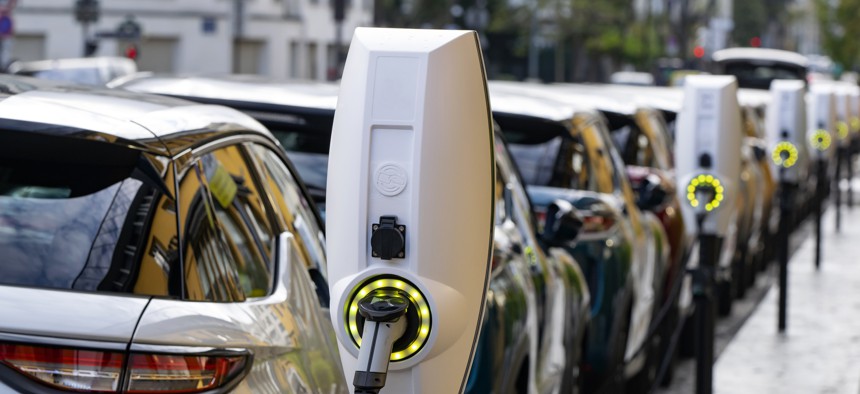50+ Utilities Join Forces to Build Out US Electric Vehicle Charging Networks

istockphoto.com/Tramino
Electric companies and the Tennessee Valley Authority want fast-charging ports available to EV drivers along major roadways by 2023.
The rollout of electric vehicles is happening faster than electric utilities had thought even a few years ago. That’s why two groups working on building out networks of electric charging stations announced this week that they will be consolidating their efforts.
More than 50 electric companies and the Tennessee Valley Authority are joining the new National Electric Highway Coalition, which wants to make sure that fast-charging ports are available to drivers of electric vehicles along major roadways by 2023.
More than 100,000 of the fast-charging ports will be needed to handle the rapidly growing number of electric vehicles in the country, according to the Edison Electric Institute, an industry group supporting the highway coalition. EEI projects that 22 million electric vehicles will be on U.S. roads in 2030.
The U.S. Department of Energy estimated that, in 2020, there were about 112,000 public charging stations in the country at about 46,000 locations.
But only 21,000 of those are “fast” chargers that could recharge a car battery in 20 to 30 minutes, instead of over a few hours. The slower chargers are more popular for residential locations, where drivers can leave their cars to recharge overnight if needed. But they could make traveling long distances much less practical.
The existing fast chargers were available at just 5,600 locations, and the vast majority of them are for Teslas. That’s not surprising, considering that Tesla accounts for nearly 80% of the electric vehicles sold in the country.
That is likely to change soon, as traditional automakers have promised to switch over their entire fleet of vehicles to electric vehicles in the coming years.
“With scores of new battery-electric vehicles coming to market over the next couple of years, we need to get the charging infrastructure sited, built and funded,” said Philip Jones, the executive director of the Alliance for Transportation Electrification, in a statement.
The industry effort comes as the federal government is getting ready to dole out $7.5 billion for electric vehicle chargers through President Biden’s recently approved infrastructure package. Of that, states would receive $5 billion, while the U.S. Department of Transportation will distribute the other $2.5 billion through competitive grants.
But states won’t be able to spend that money until federal officials put out rules on how the money is spent and approve state plans for their charging networks.
Jones said the federal funding “will help a great deal in this effort, but this is only a down payment of a much larger effort.”
“Electric companies, which are regulated by state commissions, can help leverage all funding sources, help fill the infrastructure gaps, and help manage the deployment of these chargers with a long-term view,” he explained.
The National Electric Highway Coalition is the result of the merger of two similar groups—the Electric Highway Coalition and the Midwest Electric Vehicle Charging Infrastructure Collaboration—and the addition of new utilities.
Automakers, environmental and labor groups created a separate group in August to focus on the rollout of charging stations. That group, the EV Charging Initiative, includes the Edison Institute. Its members promised to seek government support for charging infrastructure to complement their efforts.
“Only with the private investments complementing the public support will we realize our goals,” said Nancy Ryan, a partner at eMobility Advisors and an organizer of the group said in a statement. “Neither one can do it alone, but together we can create the future we want and need.”
NEXT STORY: Protecting 911 from unwanted robocalls






